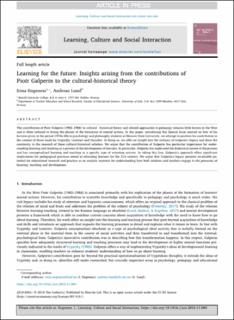| dc.contributor.author | Engeness, Irina | |
| dc.contributor.author | Lund, Andreas | |
| dc.date.accessioned | 2021-01-30T23:47:26Z | |
| dc.date.available | 2021-01-30T23:47:26Z | |
| dc.date.created | 2021-01-19T11:19:34Z | |
| dc.date.issued | 2020 | |
| dc.identifier.citation | Learning, Culture and Social Interaction. 2020, 27:100476 | en_US |
| dc.identifier.issn | 2210-6561 | |
| dc.identifier.uri | https://hdl.handle.net/11250/2725440 | |
| dc.description.abstract | The contribution of Piotr Galperin (1902–1988) to cultural - historical theory and related approaches to pedagogy remains little known in the West and is often reduced to listing the phases of the formation of mental actions. In this paper, introducing this Special Issue centred on four of his lectures given in the period 1970s–80s to psychology and philosophy students at Moscow State University, we attempt to position his contribution in the context of those made by Vygotsky, Leontiev and Davydov. In doing so, we offer an insight into the richness of Galperin’s legacy and show the continuity in the research of these cultural-historical scholars. We argue that the contribution of Galperin has particular importance for under-standing learning and teaching as a process of the development of learners. In particular, Galperin has explicated the dialectical nature of the process and has conceptualised learning and teaching as a specific type of orienting activity. In taking this line, Galperin’s approach offers significant implications for pedagogical practices aimed at educating learners for the 21st century. We argue that Galperin’s legacy presents invaluable po-tential for educational research and practice as an analytic resource for understanding how both students and teachers engage in the processes of learning, teaching and development. | en_US |
| dc.language.iso | eng | en_US |
| dc.publisher | Elsevier | en_US |
| dc.rights | Navngivelse 4.0 Internasjonal | * |
| dc.rights.uri | http://creativecommons.org/licenses/by/4.0/deed.no | * |
| dc.title | Reprint of: Learning for the future: Insights arising from the contributions of Piotr Galperin to the cultural-historical theory | en_US |
| dc.type | Peer reviewed | en_US |
| dc.type | Journal article | en_US |
| dc.description.version | publishedVersion | en_US |
| dc.subject.nsi | VDP::Samfunnsvitenskap: 200::Pedagogiske fag: 280 | en_US |
| dc.source.volume | 27 | en_US |
| dc.source.journal | Learning, Culture and Social Interaction | en_US |
| dc.identifier.doi | 10.1016/j.lcsi.2020.100476 | |
| dc.identifier.cristin | 1874119 | |
| dc.source.articlenumber | 100476 | en_US |
| cristin.ispublished | true | |
| cristin.fulltext | original | |
| cristin.qualitycode | 1 | |

